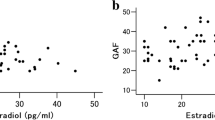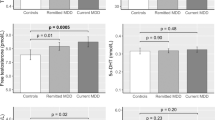Abstract
Menopause is a process characterized by a decline in estrogen levels and is therefore a period of biological vulnerability for psychotic relapse in women with schizophrenia. Our goal was to correlate not only gonadal hormone levels but also follicle-stimulating hormone (FSH) and luteinizing hormone (LH) levels with improvement in specific clinical symptoms. Thirty-seven acutely ill postmenopausal schizophrenia women with a newly initiated, clinically determined change in antipsychotic medication participated in a 12-week prospective observational outcome study. Scales used were the PANSS scale for psychotic symptoms, the PSP for functioning, and CGI for global clinical impression. Circulating FSH, LH, estradiol, progesterone, and testosterone serum levels were determined by chemiluminescent immunoassay. Partial correlational analyses were performed along with a Bonferroni significance correction (p < 0.0007). After adjustment for confounding factors, the FSH/LH ratio correlated positively with mean changes in PANSS positive scores, and there was a correlation with worsening of CGI total and cognitive scores. Testosterone was also positively associated with improvement in PANSS positive scores. However, after correction for multiple testing, the initial correlations were no longer statistically significant. In summary, while the hormone assays we did in this small sample did not prove to be significantly linked to clinical improvement in any of the schizophrenia symptom domains, we recommend further investigation of pituitary, adrenal, and gonadal hormone ratios as potential markers of clinical improvement in this population.
Similar content being viewed by others
References
Allen KM, Purves-Tyson TD, Shannon Weickert C (2015) Reproductive hormones and schizophrenia. Schizophr Res 168:601–602. doi:10.1016/j.schres.2015.07.034
Colijn MA, Nitta BH, Grossberg GT (2015) Psychosis in later life: a review and update. Harv Rev Psychiatry 23:354–367. doi:10.1097/HRP.0000000000000068
Curtin F, Schulz P (1998) Multiple correlations and Bonferroni’s correction. Biol Psychiatry 44:775–777
Cuthbert B, Insel T (2010) Classification issues in women's mental health: clinical utility and etiological mechanisms. Arch Womens Ment Health 13:57–59. doi:10.1007/s00737-009-0132-z
Dorne JL, Walton K, Renwick AG (2003) Human variability in CYP3A4 metabolism and CYP3A4-related uncertainty factors for risk assessment. Food Chem Toxicol 41:201–224
Forman RG, Demouzon J, Feinstein MC, Testart J, Frydman R (1991) Studies on the influence of gonadotrophin levels in the early follicular phase on the ovarian response to stimulation. Hum Reprod 6:113–117
Garcia-Portilla MP, Saiz PA, Bousoño M, Bascaran MT, Guzmán-Quilo C, Bobes J (2011) Validation of the Spanish Personal and Social Performance scale (PSP) in outpatients with stable and unstable schizophrenia. Rev Psiquiatr Salud Ment 4:9–18. doi:10.1016/j.rpsm.2010.11.003
González-Rodríguez A, Catalán R, Penadés R, Ruiz Cortés V, Torra M, Seeman MV, Bernardo M (2016) Antipsychotic response worsens with postmenopausal duration in women with schizophrenia. J Clin Psychopharmacol 36:580–587. doi:10.1097/JCP.0000000000000571
Hall JE (2015) Endocrinology of the menopause. Endocrinol Metab Clin N Am 44:485–496. doi:10.1016/j.ecl.2015.05.010
Haro JM, Kamath SA, Ochoa S, Novick D, Rele K, Fargas A, Rodríguez MJ, Rele R, Orta J, Kharbeng A, Araya S, Gervin M, Alonso J, Mavreas V, Lavrentzou E, Liontos N, Gregor K, Jones PB, SOHO Study Group (2003) The Clinical Global Impression-Schizophrenia scale: a simple instrument to measure the diversity of symptoms present in schizophrenia. Acta Psychiatr Scand Suppl 107:16–23
Hopewell S, Loudon K, Clarke MJ, Oxman AD, Dickersin K (2009) Publication bias in clinical trials due to statistical significance or direction of trial results. Cochrane Database Syst Rev 1:MR000006. doi:10.1002/14651858.MR000006.pub3
Ji E, Weickert CS, Lenroot R, Catts SV, Vercammen A, White C, Gur RE, Weickert TW (2015) Endogenous testosterone levels are associated with neural activity in men with schizophrenia during facial emotion processing. Behav Brain Res 286:338–346. doi:10.1016/j.bbr.2015.03.020
Klotz U (2009) Pharmacokinetics and drug metabolism in the elderly. Drug Metab Rev 41:67–76. doi:10.1080/03602530902722679
Kofinas JD, Elias RT (2014) Follicle-stimulating hormone/luteinizing hormone ratio as an independent predictor of response to controlled ovarian stimulation. Women's Health (Lond Engl) 10:505–509. doi:10.2217/whe.14.31
Leucht S, Samara M, Heres S, Patel MX, Furukawa T, Cipriani A, Geddes J, Davis JM (2015) Dose equivalents for second-generation antipsychotic drugs: the classical mean dose method. Schizophr Bull 41:1397–1402. doi:10.1093/schbul/sbv037
Lynch WJ, Roth ME, Carroll ME (2002) Biological basis of sex differences in drug abuse: preclinical and clinical studies. Psychopharmacology 164:121–137
Lyu SW, Kim JW, Choi CH, Seok HH, Yoon TK, Kim A (2013) Impact of high basal FSH/LH ratio in women with normal FSH levels on in vitro fertilization outcomes. Gynecol Endocrinol 29:424–429. doi:10.3109/09513590.2012.743002
Moore L, Kyaw M, Vercammen A, Lenroot R, Kulkarni J, Curtis J, O'Donnell M, Carr VJ, Shannon Weickert C, Weickert TW (2013) Serum testosterone levels are related to cognitive function in men with schizophrenia. Psychoneuroendocrinology 38:1717–1728. doi:10.1016/j.psyneuen.2013.02.007
Parente RC, Faerstein E, Celeste RK, Werneck GL (2008) The relationship between smoking and age at the menopause: a systematic review. Maturitas 61:287–298. doi:10.1016/j.maturitas.2008.09.021
Peralta V, Cuesta MJ (1994) Psychometric properties of the Positive and Negative Syndrome Scale (PANSS) in schizophrenia. Psychiatry Res 53:31–40
Prasad S, Gupta T, Divya A (2013) Correlation of the day 3 FSH/LH ratio and LH concentration in predicting IVF outcome. J Reprod Infertil 14:23–28
Quintas LEM, Gram KRS, da Silveira GPE, Lopes DVS, Pôças ESC (2011) Pharmacokinetic modifications and drug-drug interactions in clinical monitoring of the elderly: a short review. Pharm Anal Acta 2:141. doi:10.4172/2153-2435.1000141
Riecher-Rössler A (2017) Oestrogens, prolactin, hypothalamic-pituitary-gonadal axis, and schizophrenic psychoses. Lancet Psychiatry 4:63–72. doi:10.1016/S2215-0366 (16)30379-0
Riecher-Rössler A, Kulkarni J (2011) Estrogens and gonadal function in schizophrenia and related psychoses. Curr Top Behav Neurosci 8:155–171. doi:10.1007/7854_2010_100
Seckin B, Turkcapar F, Ozaksit G (2012) Elevated day 3 FSH/LH ratio: a marker to predict IVF outcome in young and older women. J Assist Reprod Genet 29:231–236. doi:10.1007/s10815-011-9695-5
Seeman MV (1996) The role of estrogen in schizophrenia. J Psychiatry Neurosci 21:123–127
Seeman MV (2012) Treating schizophrenia at the time of menopause. Maturitas 72:117–120. doi:10.1016/j.maturitas.2012.03.008
Shi S, Klotz U (2011) Age-related changes in pharmacokinetics. Curr Drug Metab 12:601–610
Sisek-Sprem M1, Križaj A, Jukić V, Milošević M, Petrović Z, Herceg M (2015) Testosterone levels and clinical features of schizophrenia with emphasis on negative symptoms and aggression. Nord J Psychiatry 69:102–109. doi:10.3109/08039488.2014.947320
Sollberger S, Ehlert U (2016) How to use and interpret hormone ratios. Psychoneuroendocrinology 63:385–397. doi:10.1016/j.psyneuen.2015.09.031
van der Gaag M, Hoffman T, Remijsen M, Hijman R, de Haan L, van Meijel B, van Harten PN, Valmaggia L, de Hert M, Cuijpers A, Wiersma D (2006) The five-factor model of the Positive and Negative Syndrome Scale II: a ten-fold cross-validation of a revised model. Schizophr Res 85:280–287. doi:10.1016/j.schres.2006.03.021
Weickert CS, Weickert TW (2016) Hormone modulation improves cognition in schizophrenia. Neuropsychopharmacology 41:384–385. doi:10.1038/npp.2015.269
Wolbold R, Klein K, Burk O, Nüssler AK, Neuhaus P, Eichelbaum M, Schwab M, Zanger UM (2003) Sex is a major determinant of CYP3A4 expression in human liver. Hepatology 38:978–988
Acknowledgments
This study was supported by the Ministerio de Economía y Competitividad, Instituto de Salud Carlos III (FIS: PI11/02006) Fondo Europeo de Desarrollo Regional, Unión Europea, Un manera de hacer Europa, Centro de Investigación Biomédica en Red de salud Mental, CIBERSAM, and by the Government of Catalonia, Secretaria d’Universitats i Recerca del Departament d’Economia i Coneixement (2014SGR441).
Contributors
Alexandre González-Rodríguez was involved in the statistical analysis and interpretation of data. Alexandre González-Rodríguez and Miquel Bernardo wrote the first draft of the manuscript. Rafael Penadés supported statistical analyses and reviewed the paper. Bárbara Arias and Victoria Ruiz revised the manuscript. Mary V. Seeman critically revised the paper. Rosa Catalán supervised the whole project and revised the paper.
Author information
Authors and Affiliations
Corresponding author
Ethics declarations
Disclosures
Miquel Bernardo has been a consultant for, received grant/research support and honoraria from, and been on the speakers/advisory board of ABBiotics, Adamed, Boehringer, Eli Lilly, Ferrer, Forum Pharmaceuticals, Janssen-Cilag, Lundbeck, Otsuka, and Pfizer. Alexandre González-Rodríguez has received honoraria or paid for travels from Pfizer, Janssen, Lundbeck-Otsuka, and Ferrer. Rosa Catalán has received honoraria or has been paid for travels from Lilly, Lundbeck, Janssen, Ferrer, Pfizer, and Bristol. Rafael Penadés has received honoraria or paid for travels from Otsuka-Lundbeck and Janssen-Cilag. Victoria Ruiz-Cortés has been paid for registration at congresses from Janssen-Cilag. Mary V. Seeman has been a consultant for Clera Inc. The remaining authors have no conflicts of interest to declare.
Informed consent
The research was approved by the Ethics Committee of the Hospital Clinic, and all participants gave their written informed consent to be included in the research.
Rights and permissions
About this article
Cite this article
González-Rodríguez, A., Bernardo, M., Penadés, R. et al. Do FSH/LH ratio and gonadal hormone levels predict clinical improvement in postmenopausal schizophrenia women?. Arch Womens Ment Health 20, 613–620 (2017). https://doi.org/10.1007/s00737-017-0757-2
Received:
Accepted:
Published:
Issue Date:
DOI: https://doi.org/10.1007/s00737-017-0757-2




